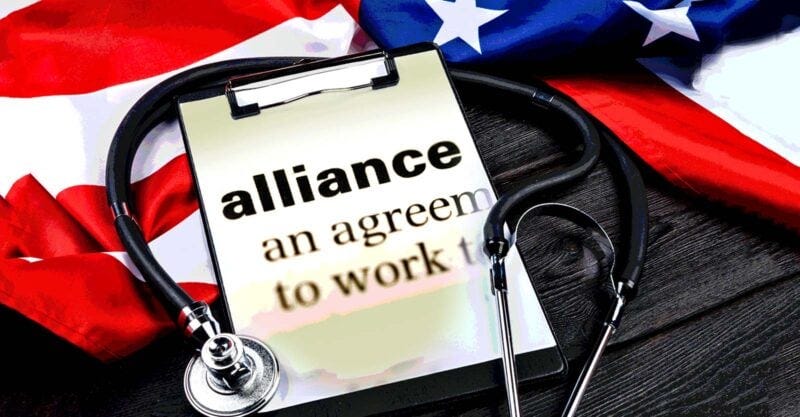15 Democratic Governors Form ‘Nonpartisan’ Alliance to Bypass RFK Jr.’s Health Policies
Several members of the alliance are considering 2028 bids for the presidential election.
This article originally appeared on The Defender and was republished with permission.
Guest post by Brenda Baletti, Ph.D.
Fifteen Democratic governors launched an alliance to take public health into their own hands by targeting pandemic preparedness and vaccine coordination. An HHS spokesperson warned that the same states whose COVID-19 policies eroded trust are now “trying to reinvent public health under the guise of ‘coordination.’”
Fifteen Democratic governors have launched an initiative to coordinate their public health efforts independently of national public health agencies, The Wall Street Journal reported on Wednesday.
The Governors Public Health Alliance plans to share data to monitor disease outbreaks, develop public health guidance and pandemic preparedness policies, and purchase vaccines and other products.
According to its website, still in development, the alliance is a “nonpartisan” nonprofit working together to “protect public health.” The alliance hasn’t yet divulged any funding sources.
Members say the alliance — created in response to federal public health policy under the Trump administration — will take on work typically performed by federal institutions housed within the U.S. Department of Health and Human Services (HHS).
Alliance members include California, Colorado, Connecticut, Delaware, Guam, Hawaii, Illinois, Maryland, Massachusetts, New Jersey, New York, North Carolina, Oregon, Rhode Island and Washington.
Several participating governors openly criticized recent federal health policies.
“When the federal government abandons science for conspiracy theories, slashes Medicaid, and undermines vaccine integrity, states must stand united to defend the facts,” Illinois Gov. JB Pritzker said in a statement reported in The Washington Post.
“At a time when the federal government is telling the states, ‘you’re on your own,’ governors are banding together,” Maryland Gov. Wes Moore stated in comments reported by The Associated Press.
HHS spokesperson Andrew Nixon told the Post that the states involved in the alliance enforced “unscientific school closures, toddler mask mandates, and vaccine passports during the COVID era.” Nixon added:
“Now, the same governors who eroded that trust are trying to reinvent public health under the guise of ‘coordination.’
“The Trump Administration and [U.S. Health Secretary Robert F. Kennedy Jr.] are rebuilding that trust by grounding every policy in rigorous evidence and gold standard science — not the failed politics of the pandemic.”
‘Nonpartisan’ alliance ‘effectively creates divergent public-health ecosystems’
Several members of the alliance — including California Gov. Gavin Newsom, Pritzker and Moore — are considering 2028 bids for the presidential election.
Dr. Mandy Cohen, director of the Centers for Disease Control and Prevention (CDC) under the Biden administration, advises the group.
Dr. Anand Parekh, chief health policy officer at the University of Michigan School of Public Health and a former HHS deputy assistant secretary of health, told the Post that states lack the technical capacity of the CDC, which operates unique data systems for infectious disease surveillance.
Research scientist and author James Lyons-Weiler, Ph.D., told The Defender that the all-Democratic partisan alliance splits public health along ideological lines, runs counter to the spirit of the Constitution, and could pose real health threats.
“Federalism was designed for distributed competence, not for partisan health blocs,” he said. “If this becomes a mechanism for ideological public health rather than empirical governance, it will violate the spirit — if not the letter — of constitutional balance.”
States have broad police powers over public health under the 10th Amendment, but the risks of this alliance transcend borders, he said, adding:
“When 15 governors band together outside the federal framework, the danger is incoherence — 50 epidemiologies, 50 data standards, 50 truths. Pathogens and vaccine injuries do not recognize state lines, and neither should our preparedness architecture.
“There’s nothing unconstitutional about cooperation among states — but when the alliance issues policies that contradict federal law or federally funded programs, Supremacy Clause preemption will trigger immediate conflict. Coordination is lawful — parallel and leapfrog governance is not.”
Lyons-Weiler said the alliance “effectively creates divergent public-health ecosystems.”
It will be a “natural experiment” to see if different policies produce differences in chronic disease, mental health or mortality trends. “It should make for interesting learning opportunities about the effects of medical and public health policies on human health,” he said.
“I am not at all sure that Pharma’s purchase of the DNC [Democratic National Committee] on the matter of forced vaccination will translate into political success at the state level,” Lyons-Weiler said. “It certainly flopped in the federal elections.”
Kennedy’s policy changes spark calls to resign
Kennedy has introduced a series of policy changes in recent months.
In September, the CDC ended the universal recommendation for COVID-19 vaccines, while still making them available to anyone who wants them.
In June, Kennedy removed all sitting members from the CDC’s vaccine advisory committee, citing conflicts of interest. He replaced them with new members.
The new committee stopped recommending thimerosal-containing vaccines for children and began debating whether the hepatitis B vaccine should be given to all infants at birth.
In April, Kennedy launched an investigation into the root causes of autism. In September, the U.S. Food and Drug Administration (FDA) began a process to add warnings to Tylenol, advising pregnant women to use it only when necessary because of possible links to autism in vulnerable children.
These moves sparked significant backlash from senators, including calls for Kennedy’s resignation.
Several states move to break with federal policy
The governors’ alliance is one of several recent examples of states breaking from federal health policies and setting their own.
Last month, four Western states — California, Oregon, Washington and Hawaii — announced the formation of the West Coast Health Alliance, a public health partnership intended to issue its own immunization guidelines.
In their joint statement announcing the alliance, the states said the CDC “has become a political tool that increasingly peddles ideology instead of science,” which “will lead to severe health consequences.”
A few weeks later, Newsom signed a law authorizing California to set its own vaccine guidance based on the recommendations of professional organizations — including the American Academy of Pediatrics (AAP) — instead of CDC recommendations.
In September, several states moved to counter the FDA’s announcement in August to end its broad authorization of COVID-19 vaccines, restricting the shots to people at higher risk of severe illness.
Massachusetts became the first state to mandate that insurers cover the COVID-19 vaccines.
New York Gov. Kathy Hochul declared a “statewide disaster emergency” and issued an executive order to preserve access to the COVID-19 vaccine — a possible prelude to the formation of a public health alliance by eight northeastern states.
Minnesota Gov. Tim Walz signed an executive order giving healthcare providers in the state the ability to “use their medical judgment” to recommend and administer vaccines.
New Jersey’s Department of Health issued an executive directive authorizing anyone 6 months of age and older to receive a COVID-19 shot.
Pennsylvania’s State Board of Pharmacy voted to bypass federal guidelines by allowing pharmacists to continue administering COVID-19 vaccines. Colorado, Nevada and New Mexico have enacted similar guidelines.
In August, the AAP and other major medical associations recommended COVID-19 shots for infants, young children and children in “high-risk” groups, diverging from the CDC on childhood vaccine guidance for the first time in 30 years.
Related articles in The Defender
California Passes Law Giving State Authority to Set Its Own Vaccine Guidance
‘Dangerous Games’: States Defy Federal Agencies, Create Their Own COVID Vaccine Rules
Eight Northeast States Eye End Run Around CDC Vaccine Recommendations
Leading Pediatrician Group Defies CDC, Tells Parents to Get COVID Shots for Infants, Kids
Pharma-Friendly Public Health Officials Launch New Project to ‘Shore Up U.S. Vaccination Policy’
Donate to Children’s Health Defense



Colorado Governor Jared Polis also signed a bill in Colorado that keeps women from get the abortion reversal pill. He obviously doesn't care about women or babies.
Colorado Governor Jared Polis thinks the mutilation of children's bodies to be a different gender is health care, and abortion, which is the murder of babies is healthcare, and he thinks hospitals should not help people that are unvaccinated. He also took away the death penalty in Colorado for murder's during the 2020 plandemic, while letting criminals out jail during 2020. He is mentally insane!